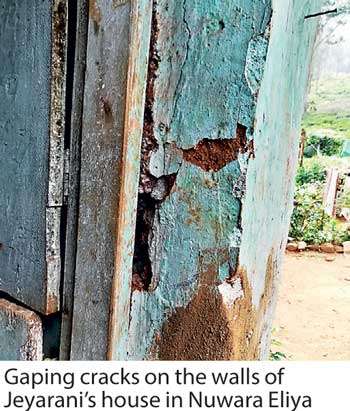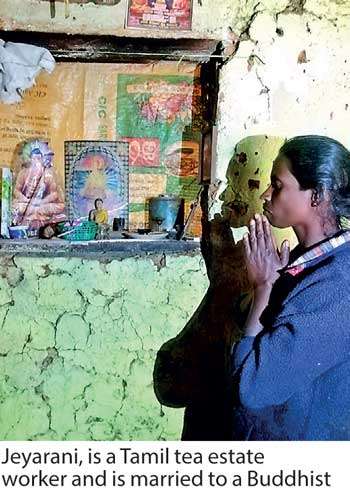15 Jan 2019 - {{hitsCtrl.values.hits}}

A girl, carrying a basket full of water collected from another house, smiles for the camera
Pix by Piyumi Fonseka
 I was holding onto the wall while taking off my shoes to enter another house of a tea estate worker, Jeyarani, in Nuwara Eliya. A piece of cement suddenly broke off from the wall, I was holding onto.
I was holding onto the wall while taking off my shoes to enter another house of a tea estate worker, Jeyarani, in Nuwara Eliya. A piece of cement suddenly broke off from the wall, I was holding onto.
There were many gaping cracks on the walls of Jeyarani’s house. Her attempt to cover the bigger cracks with cow dung seemed to be merely a temporary solution.
Jeyarani is Tamil, and is married to a Buddhist. Her house possessing a leaking roof, comprising corrugated iron sheets, and weakened and cracked walls doesn’t provide safe shelter for her husband, their two young daughters and son and herself. Their house is not capable of protecting them from inclement weather. Poor sanitation facilities, the absence of piped water and proper toilet facilities double their difficulties.
Even after living for nearly two centuries in Sri Lanka since their arrival from South India, during the British colonial time, Indian origin tea estate workers still live in a poor condition trapped in an unchanged socio-economic structure of life.
Delving into the living conditions of estate workers one quickly finds out that the level of income plays a vital role. Majority of the estate sector workers are not paid a sufficient living wage that meets their basic requirements.
Congested houses
 The Daily mirror witnessed that most of the traditional line rooms of tea estate workers-which are usually 10X10 feet in size, still have the same conditions that existed many decades ago. Very few line rooms have been upgraded or reconstructed by the estate or the workers.
The Daily mirror witnessed that most of the traditional line rooms of tea estate workers-which are usually 10X10 feet in size, still have the same conditions that existed many decades ago. Very few line rooms have been upgraded or reconstructed by the estate or the workers.
In almost all the line rooms the Daily mirror visited, it was eminent that the father, mother, adult sons, daughters, grandparents and married members of the families live as if tightly packed into a tea sachet. The space within the tiny line rooms is used for sleeping, eating, living and all other purposes.
Jeyarani said the married families living together in one house, face severe difficulties every day. “Men, women, young daughters and young sons all live in one room. These daughters cannot even change their clothes inside the house,” she said.
There are seven members in Sinnathambi’s family living in a house measuring just 10×10 feet. Fifty-four-year old Sinnathambi is a worker at Badulla Wewessa Tea Estate.
“We face various difficulties in living in this tiny space. Along with our children and grandchildren, there are a total of seven people living in our house. Some people are capable of upgrading their line rooms with the permission of the estate owners, but we struggle to meet even the daily needs,” he complained.

Some people are capable of upgrading their line rooms with the permission of the estate owners, but we struggle to meet even the daily needs
-Sinnathambi
Many houses do not have electricity. They do not have adequate latrine facilities. Most of the latrines aren’t properly maintained.
“My neighbours and we share the same available latrines,” Sinnathambi said.
There is no space between two line rooms because a single wall divides two houses. Several married families live sandwiched as a result.
He said, “politicians visit our houses before every election and make promises to reconstruct them. We are fooled and vote for them. After winning the elections, they forget the promises made to us”.
However, there was a little progress in the infrastructure facilities of some houses. Housing upgrading programmes have been conducted by the Government and NGOs from time to time. Upgrading of the houses saw improvements being made to kitchens and roofs; the latter taking the form of re-roofing. Despite some traditional line rooms having being slightly developed, overcrowding still remains a significant problem for their residents.

Deprived of land and rights
The ownership of the line rooms or land is not given to the family occupying the residence although they live here for generations. Kamalaraj, a tea estate worker in Walapane said that the estate authorities deny them the fundamental right to own a land. He also said that their community is always under threat of eviction by the estate owners.
M.P. Baskaran (60), another tea estate worker from a Walapane, said that although he has been serving the estate during his entire life and living in the provided line room since birth, he owns neither the house nor the land.

We are in a situation where we cannot think of escaping from this poverty or at least taking our children out of this pathetic lifestyle
-M.P.Baskaran
“There is nothing in my name. We earn money and spend it for the daily needs. We are in a situation where we cannot think of escaping from this poverty or at least taking our children out of this pathetic lifestyle.
There are several families living in the same house. Imagine the difficulties they have of facing every single day. They have no place to go. All of them have to live together amid hardships because they have no option,” Baskaran said.
Indebted for generations
 Recent studies have shown that compared to other sectors in Sri Lanka the estate sector has an increasing rate of debt and thereby negative saving. These questions arise because the estate sector people can never save any money since their monthly expenditure exceeds their monthly household income.
Recent studies have shown that compared to other sectors in Sri Lanka the estate sector has an increasing rate of debt and thereby negative saving. These questions arise because the estate sector people can never save any money since their monthly expenditure exceeds their monthly household income.
“Our expenses always exceed the income. Therefore, even though we want, we cannot save any money for our children’s futures,” female tea estate worker B. Sumathi said.
The very unhealthy financial situation of many estate workers has pushed them towards indebtedness. Sumathi told us that this situation is common with almost all the estate sector workers, making them indebted for generations.
“We have bank accounts not for saving purposes. We get our salaries through those bank accounts. So, we use them just for transaction purposes,” Sumathi said.
Heavy spending on alcohol
Another factor that the Daily mirror unearthed during this tour was over-expenditure when purchasing alcohol with regard to males in the estate sector families. This situation is the same in almost every house we visited.
Kamalaraj, a breadwinner of a family of eight, from Nuwara Eliya said that every morning he was unbale to start work at the estate without consuming alcohol. According to him, despite his poor financial condition, drinking alcohol is a daily and a compulsory habit among male estate workers.
Contributions to Trade Unions
 There are around five main trade unions operating in the estates. At a time when the expenditure for food, health, education, transport and clothes is questioning whether the basic needs of estate workers are fulfilled, compared to other ordinary workers, every tea estate worker is supposed to pay Rs.150 per month as the contribution to the trade union the individual is a member of. Even the Ceylon Teachers’ Union, one of the main trade unions in the country, charges only Rs.20 per month from every member.
There are around five main trade unions operating in the estates. At a time when the expenditure for food, health, education, transport and clothes is questioning whether the basic needs of estate workers are fulfilled, compared to other ordinary workers, every tea estate worker is supposed to pay Rs.150 per month as the contribution to the trade union the individual is a member of. Even the Ceylon Teachers’ Union, one of the main trade unions in the country, charges only Rs.20 per month from every member.
Estate worker Ranjan (43) from Walapane criticised the estate trade unions for charging Rs.150 from their salaries every month.
“How unfair and inhumane it is to snatch such an amount of money from our monthly salaries and not do anything for our betterment? We cannot avoid that payment. By collecting Rs.150 from each and every worker, these trade unions are making millions of money every month. Do they spend that money to do anything for us? No,” Ranjan said.
Social discrimination
The social status, recognition and respect of estate workers are considered to be based on their living space; which is the line room. The line room residents who were interviewed revealed that they get lower social recognition compared to others if they revealed their line room identity.
“I think it is all in the minds of other people. We are discriminated against when we tell them where we live. We have been branded as layme ayo (Tamils in line rooms). When we visit a Government institution the officials refuse to help us and instead ask us to go to the estate owners because we belong to them,” the estate worker Jeyarani lamented.
Stagnant lives
 According to the opinion of sociologist Prof. Siri Hettige, there are two main reasons as to why the living conditions of tea estate workers are stagnant.
According to the opinion of sociologist Prof. Siri Hettige, there are two main reasons as to why the living conditions of tea estate workers are stagnant.
“Either plantation companies make huge profits and they neglect the tea workers or the tea industry as a whole is on the brink, decreasing the turnover of plantation owners,” he said.
Prof. Hettige was of the view that the lack of investment on research in the tea plantation sector, despite having a dedicated research institute centre for tea, is one of the main reasons for a probable downturn in the industry.
He said having not made technological improvements that could have increased productivity have also contributed to the decline experienced in the Sri Lankan tea industry. “Due to the above reasons, estate owners might not be making huge profits to distribute to the workers.” he said.
However, he said that the issues faced by the estate workers should not be confined to the companies. “The solution requires a joint effort by both the Government and the companies,” he added.
He suggested that similar to the Government’s Samurdhi programme for low-income households, a programme should be introduced to eliminate the extreme poverty level experienced by tea estate workers.

Either estate companies make huge profits and they neglect the tea workers or the tea industry as a whole is on the brink, decreasing the turnover of plantation owners
- Prof. Siri Hettige
Better living conditions impact productivity
A research done by Ajantha Kalyanaratne, senior lecturer in Economics at Sri Jayawardanepura University, has revealed that productivity of a tea estate worker living in an improved house is up by 150%, a figure higher than that of a worker living in a traditional line room which is more vulnerable to health issues.
As Dr. Kalyanarathna’s research findings stated that improving the living conditions of tea estate workers would benefit both workers and the companies.
In spite of the harsh reality they face, there was a smile on every worker’s face. These tea plantation workers still have dreams and wish to change their lives. Let this article be a stark reminder for the authorities to open their eyes and do the needful. In order to find a solid solution for the workers’ issues, an effective social dialogue should take place involving different parties, including the estate owners, trade unions, workers and the government.
The first article headlined ‘Workers Left out of the Tea Party’ in the series ‘Stories Behind Your Cup of Tea’ covered topics including wage issues, working conditions and occupation safety of tea estate workers. It was published in the on January 02.
The next article in the series will highlight the difficulties faced by Sri Lankan female tea plantation workers while on the field.
30 Nov 2024 1 hours ago
30 Nov 2024 4 hours ago
30 Nov 2024 6 hours ago
30 Nov 2024 7 hours ago
29 Nov 2024 29 Nov 2024